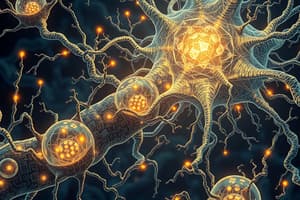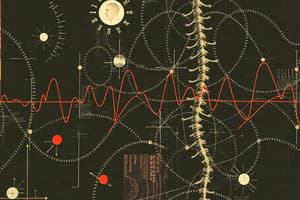Podcast
Questions and Answers
What primarily establishes the resting membrane potential of neurons?
What primarily establishes the resting membrane potential of neurons?
- Constant leak current from leak channels (correct)
- Voltage-gated channels
- Electrical signaling via neurotransmitters
- Chemical-gated channels
Which type of channel is directly affected by the binding of a neurotransmitter?
Which type of channel is directly affected by the binding of a neurotransmitter?
- Voltage-gated channels
- Leak channels
- Passive diffusion channels
- Chemical-gated channels (correct)
What is the function of voltage-gated sodium channels in neurons?
What is the function of voltage-gated sodium channels in neurons?
- Allowing passive ion diffusion
- Regulating cell volume
- Binding neurotransmitters
- Initiating the action potential (correct)
Which ion is commonly associated with leak channels?
Which ion is commonly associated with leak channels?
What is a key characteristic of leak channels compared to other ion channels?
What is a key characteristic of leak channels compared to other ion channels?
Which neurotransmitter is involved in the opening of chemical-gated channels?
Which neurotransmitter is involved in the opening of chemical-gated channels?
How do voltage-gated channels respond to changes in membrane potential?
How do voltage-gated channels respond to changes in membrane potential?
What role do leak channels play in cellular function?
What role do leak channels play in cellular function?
Flashcards
Leak Channels
Leak Channels
Ion channels constantly open, allowing ions to diffuse passively across the cell membrane.
Resting Membrane Potential
Resting Membrane Potential
The electrical potential difference across the cell membrane when the cell is not actively signaling.
Chemical-gated (Ligand-gated) Channels
Chemical-gated (Ligand-gated) Channels
Channels that open or close in response to a specific chemical messenger (like a neurotransmitter).
Synapse
Synapse
Signup and view all the flashcards
Voltage-gated Channels
Voltage-gated Channels
Signup and view all the flashcards
Action Potential
Action Potential
Signup and view all the flashcards
Ion Permeability
Ion Permeability
Signup and view all the flashcards
Neurotransmitter
Neurotransmitter
Signup and view all the flashcards
Study Notes
Leak Channels
- Leak channels are ion channels that are constantly open, allowing ions to passively diffuse across the cell membrane.
- They play a crucial role in establishing and maintaining the resting membrane potential of neurons and other excitable cells.
- Leak channels are selective for specific ions, such as potassium (K+) and sodium (Na+).
- The continuous flow of ions through leak channels creates an electrical gradient across the membrane.
- This continuous flow is also known as a constant leak current.
- Leak channels are important for maintaining cell volume and regulating cellular functions. They are not gated, meaning they are always open.
Chemical-Gated Channels
- Chemical-gated (ligand-gated) channels open or close in response to the binding of a specific chemical messenger, such as a neurotransmitter.
- These channels are crucial for signal transmission at synapses and other chemical signaling junctions.
- The binding of a neurotransmitter to the channel's receptor site causes a conformational change in the channel protein, altering its permeability to specific ions.
- Binding of particular neurotransmitters induces changes in permeability to ions such as sodium (Na+), potassium (K+), calcium (Ca2+), or chloride (Cl–).
- The opening and closing of chemical-gated channels are tightly regulated, ensuring that signals are precisely controlled.
- Examples of neurotransmitters that act on this type of channel include acetylcholine, glutamate, GABA, and serotonin.
Voltage-Gated Channels
- Voltage-gated channels open or close in response to changes in the membrane potential.
- These channels are crucial for generating and propagating action potentials in neurons.
- They are crucial in fast signal transmission along nerve cells and muscle cells.
- The channels have a voltage sensor that detects alterations in the membrane potential.
- The interaction between the membrane potential and the channel protein leads to a conformational change, which, in turn, affects ion permeability.
- Voltage-gated channels are highly selective for specific ions, such as sodium (Na+), potassium (K+), and calcium (Ca2+).
- These channels have characteristic opening and closing kinetics (depolarization and repolarization).
- The activation of voltage-gated sodium channels initiates the action potential.
- The inactivation of voltage-gated sodium channels prevents the backwards propagation of the action potential.
- Potassium channels open after sodium channels to restore the resting membrane potential.
- Calcium channels play a critical role in neurotransmitter release.
Studying That Suits You
Use AI to generate personalized quizzes and flashcards to suit your learning preferences.



